Rachel Reeves insisted trade with the EU is more important than dodging Donald Trump‘s tariffs as she prepares for talks with her counterpart in Washington today.
The Chancellor suggested the government could prioritise ties with Brussels ahead of sitting down with Treasury Secretary Scott Bessent.
Ms Reeves has been sending strong signals that she is ready to cut duties on American car imports as part of a trade deal to reduce eye-watering 25 per cent tariffs on UK car exports, steel and aluminium.
She is also hoping to head off the threat that the pharma industry will be targeted in another wave of levies.
But US ambassador Lord Mandelson acknowledged at a reception last night that the process so far had been a ‘rollercoaster’.
And Ms Reeves emphasised the looming Brexit ‘reset’ next month, with signs Keir Starmer will make concessions on fishing, a youth mobility scheme and taking EU rules to get a closer relations.
‘I understand why there’s so much focus on our trading relationship with the US but actually our trading relationship with Europe is arguably even more important, because they’re our nearest neighbours and trading partners,’ the Chancellor told the BBC.
‘Obviously I’ve been meeting Scott Bessent this week whilst I’m in Washington, but I’ve also this week met the French, the German, the Spanish, the Polish, the Swedish, the Finnish finance ministers – because it is so important that we rebuild those trading relationships with our nearest neighbours in Europe, and we’re going to do that in a way that is good for British jobs and British consumers.’
A Downing Street spokesman said: ‘It’s a statement of fact the EU is our largest trading partner.
‘But as the PM has said, it’s a false choice between the two.’
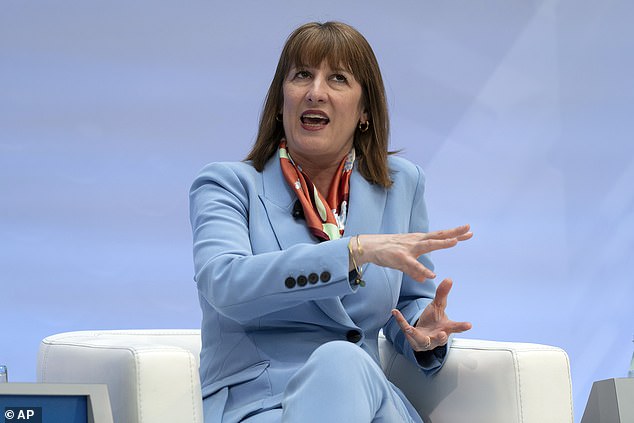
Rachel Reeves will hold crucial talks with her US counterpart today as she scrambles to find a way of dodging Donald Trump ‘s tariff attacks
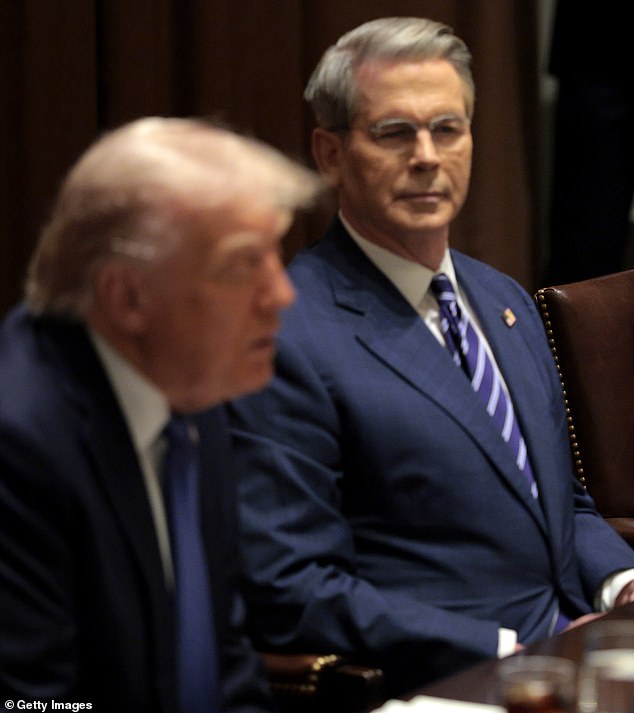
The Chancellor will sit down with Treasury Secretary Scott Bessent (pictured) in Washington, where they have been both attending an IMF summit
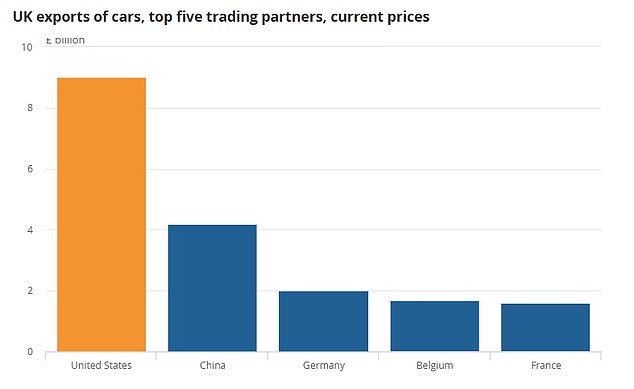
The importance of an agreement was laid bare this morning with official figures showing 27.4 per cent of British-made cars went to the US last year – worth £9billion
The importance of an agreement with the US was laid bare this morning with official figures showing 27.4 per cent of British-made cars went to the States last year – worth £9billion.
Overall trade in goods was largely balanced, with £59.3billion exported to the US and £57.1billion imported.
The backdrop to the negotiations is growing gloom around the UK economy, with stalling growth raising fears that Ms Reeves will be forced to hike taxes or cut spending again in the Autumn.
Mr Trump’s ‘Liberation Day’ bombshell saw Britain hit with 10 per cent tariffs on all exports to the US, as well as a 25 per cent global levy on cars, steel and aluminium.
It initially looked like the UK had escaped lightly compared to other trading partners, but the president has since backed off imposing punitive rates on the EU, and held out an olive branch to China.
Sir Keir is hoping to get a US trade deal over the line before a summit slated for May 19 to seal the ‘reset’ with Brussels.
Mr Trump has claimed the EU was created to ‘screw’ America, and praised the UK for leaving the bloc.
Ms Reeves has described the discussions with her fellow finances ministers as ‘difficult’ after Mr Trump launched his trade war.
The Chancellor told the BBC she ‘understands what president Trump wants to address’ on trade imbalances.
‘We’re all grappling with this issue of tariffs but I think that there is an understanding why president Trump wants to address some of the global imbalances there are in the system,’ she told the broadcaster.
Ms Reeves said there is ‘a deal to be done’ with Washington, despite suggestions from senior US officials that Mr Trump regards the 10 per cent tariff as a ‘baseline’ he is unlikely to go below.
But she has also ruled out several concessions the US is thought to be looking for as the price of a deal.
These include reductions in food standards rules that limit imports of American agricultural goods and changes to online safety legislation that some US politicians believe limit freedom of speech.
So far, the Chancellor has used her visit to the IMF to champion free trade, telling a panel event last night that she wanted to see both tariff and non-tariff barriers reduced.
But she added that developed economies could not afford to be ‘agnostic or naive’ about where goods were produced at a time when ‘resilience and security matter more than they have done for a long time’.
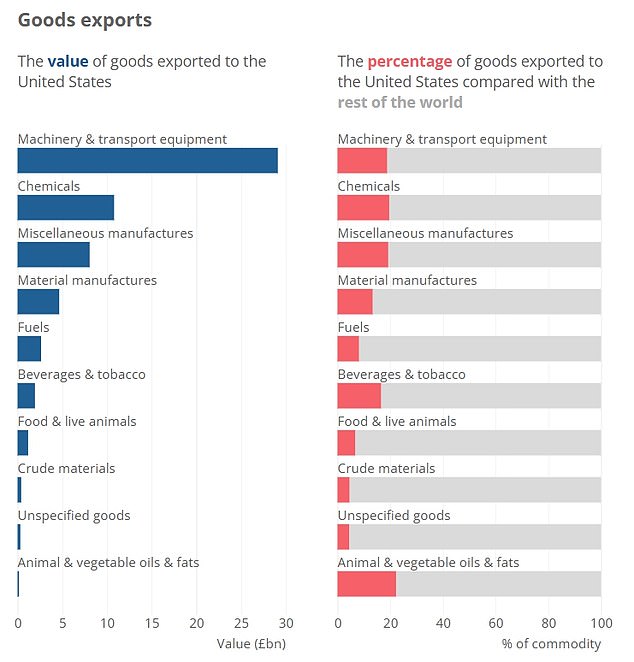
Overall trade in goods was largely balanced, with £59.3billion exported to the US and £57.1billion imported
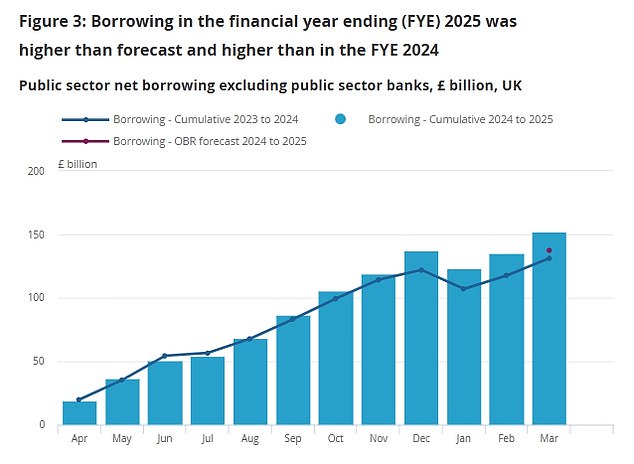
The backdrop to the negotiations is growing gloom around the UK economy , with stalling growth raising fears that Ms Reeves will be forced to hike taxes or cut spending again in the Autumn
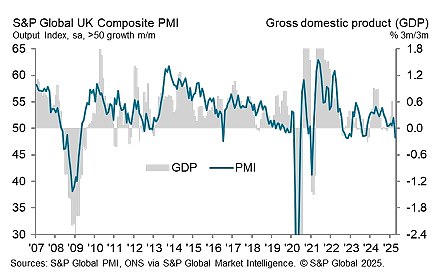
The closely-watched PMI survey this week suggested that the economy has fallen into the red
At the same event, IMF managing director Kristalina Georgieva praised the Chancellor’s efforts to ‘lift up growth in the UK’.
Ms Georgieva said: ‘She is tackling very tough issues, getting reprioritisation of spending, getting the regulatory environment to be more rational and then taking on the battle to get it done, and it’s really impressive.’
Ms Reeves told the BBC that conversations at G20 meetings this week had been difficult.
‘Obviously there are strains,’ she said. ‘We are all following what’s happening in our domestic bond markets, in our equity markets, and we all know that that uncertainty is bad for investment in the UK economy.’







